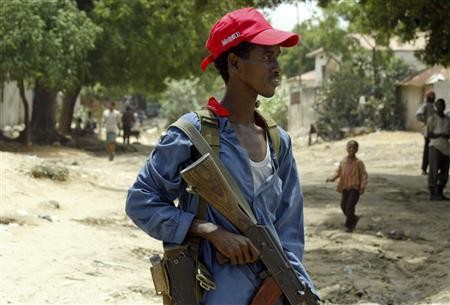 Recent clashes between insurgents from the Union of Islamic Courts (UIC) and Ethiopian troops backing Somali government forces have resulted in at least 291 civilian casualties in the Somali city of Mogadishu. Spokesmen from the Elman Human Rights Organization, a Somali based group, have said many of the victims were caught in crossfire. Six insurgents were reported killed as well, though reports from early April put the total civilian death toll at over 600, as residents have been urged to abandon the capital city.
Recent clashes between insurgents from the Union of Islamic Courts (UIC) and Ethiopian troops backing Somali government forces have resulted in at least 291 civilian casualties in the Somali city of Mogadishu. Spokesmen from the Elman Human Rights Organization, a Somali based group, have said many of the victims were caught in crossfire. Six insurgents were reported killed as well, though reports from early April put the total civilian death toll at over 600, as residents have been urged to abandon the capital city.
Figures from the United Nations state more than 320,000 people, nearly a third of Mogadishu, have fled since February. The UN has been warning a humanitarian disaster is imminent. Many residents have been dying from cholera and diarrhea, and food and water is increasingly scarce. The United Nations Children's Fund (UNICEF) has urged warring parties to respect the laws of war and accuse combatants of blocking humanitarian aid to troubled regions.
The UIC were ousted in December after six months in power. The hardliners in the group swore they would start an insurgent war against the Ethiopian supported Somali transitional government. The insurgent forces of the group are also loyal to Hawiye clan, the largest clan in the region. The Hawiye clan declared war against the Ethiopian armies in early April.
 Somalia has been under control of various warlords and has not had a legitimate government in 16 years. The UIC emerged from this chaos, as local businessmen wanted to have some method to ensure respect for contracts. During their control, the UIC stated they wanted to restore stability and order in Somalia, though their methods include strict observance of Islamic law and the banning of outside influence, football, and monitors radio and news programming. Though similar to the Taliban in Afghanistan, many locals welcomed the order the UIC brought.
Somalia has been under control of various warlords and has not had a legitimate government in 16 years. The UIC emerged from this chaos, as local businessmen wanted to have some method to ensure respect for contracts. During their control, the UIC stated they wanted to restore stability and order in Somalia, though their methods include strict observance of Islamic law and the banning of outside influence, football, and monitors radio and news programming. Though similar to the Taliban in Afghanistan, many locals welcomed the order the UIC brought.
The UN recognizes the Somalia transitional government that was setup in 2004. The region has been battling over border disputes for many years. Ethiopia's rivals in Eritrea are accused of supplying the UIC forces with weapons and the battle in Mogadishu is symbolic of the larger conflict. African Union troops are trying to mediate the conflict, though their troops fall short of their stated goals. In January, US Special Forces were deployed to the region to hunt al Qa'ida operatives and provide training to Ethiopian and Somali forces.
Wire services are reporting heavy shelling in the Somali capital today, marking the 6th day of conflict.
Photo credit: Reuters